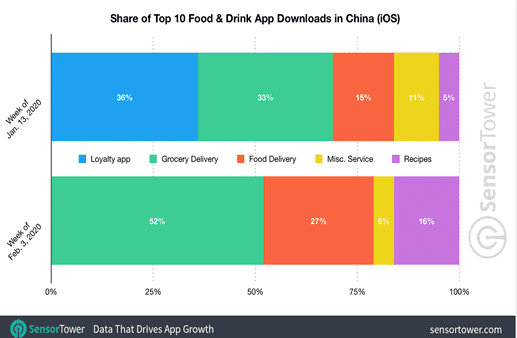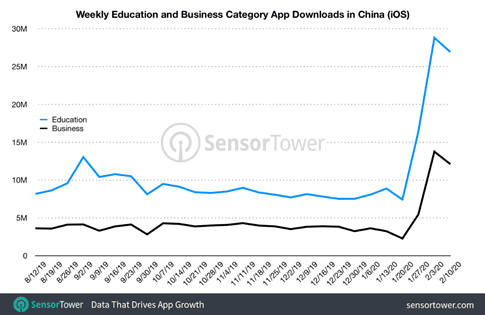
Click to learn more about author Samuel Bocetta.
Amidst all the talk of lockdowns, quarantines, and a looming global economic crash, it can be easy to forget that some companies are doing pretty well during the current pandemic.
Unlike previous economic crises, this crisis has led to a widespread change in working practices and has also fundamentally changed the way that customers access entertainment and health services. Whilst we are only a few weeks into this new world, some have predicted that these shifts will have a long-term impact on the economy.
In other words, the current changes might be permanent.
Keeping your company strong during this pandemic, and preparing for a post-COVID-19 economy rests on a few key principles. You need to protect your most important assets while your staff is working remotely, of course. You may also need a new approach to customer relationships. Primarily, though, surviving this period and prospering in the future means learning from the companies who are doing well. In this article, we’ll show you how to do that.
Cybersecurity
Finally, the sector that will gain the most from the pandemic might turn out to be the cybersecurity industry. Given the other sectors we’ve mentioned above, this is not surprising.
Almost all of the companies who are making gains during the crisis rely on online platforms, and people are seeking to protect their own data and privacy as never before.
In fact, many cybersecurity analysts are rejoicing, because they feel that the current crisis has finally achieved what they have been arguing for years: users taking responsibility for their own security by using no-logging VPN services and other security tools that bolster security when working remotely.
This crisis, they argue, points to the future of cybersecurity, in which the burden of cybersecurity is taken off of private companies and gradually shared out more evenly between customers and a federal department of cybersecurity.
Health and Wellness
The most imminent and obvious effect of COVID-19 has been that more and more people are seeking health advice online. In the wake of government announcements that people should stay at home and only see a doctor if truly necessary, people all over the world are turning to online health apps to diagnose themselves and obtain healthcare advice.
These concerns are well reflected in data on the number of healthcare apps that have been downloaded over the past few weeks. Newly Chinese registered users on online healthcare platforms grew almost 10 times in the last month, with an average daily consultation of about nine times as many normal users.
Alongside health advice, customers are also turning to fitness apps that help them to keep fit at home. Keep, for instance, is a Chinese fitness app that offers workout programs ranging from yoga to cycling and has shot up in the ranking on the App Store in the past few weeks. In mid-January, the app sat at a lowly 260th place in terms of downloads. At the time of this writing, it has ascended to 79th place.

It might seem difficult to draw lessons from this if your company doesn’t offer health or fitness services. However, many of these apps run on an advertiser model. Given the huge spikes in demand for them, it is worth considering buying ads, no matter what your company offers.
Remote Working Solutions
Remote working has been more than possible for most businesses for more than a decade, but before the current crisis, many have been reticent to take advantage of it. Now, with all staff who can be required to do so working from home in many countries, companies have had little choice but to finally roll out remote working solutions.
Some companies are going to profit massively from this shift. Alibaba’s DingTalk, Tencent’s WeChat Work, ByteDance’s Lark, and Zoom in the U.S. have all seen user numbers increase dramatically over the past few weeks. Some have increased their number of downloads by 10 times. It’s not just online meeting platforms that will benefit from this, though. Many companies are taking the opportunity to upgrade their business phone system to deal with increased call volume and give their employees more options when it comes to working remotely.
The lesson here, for companies who will not directly benefit from this increased demand, is to choose their remote working platform carefully. After the crisis is over, many companies will find that the benefits of remote working — not least for the expenditure on office rent — will make it hard to go back to having in-office workers. In the post-pandemic economy, in fact, companies might need to use remote working more than ever before, in order to merely stay profitable. For that reason, it’s best to use the current crisis as an opportunity to prepare for the future.
Delivery, Delivery, Delivery
Companies offering delivery services are also seeing huge gains right now. Like remote working, the infrastructure that underpins delivery services has been in place for decades now, but organizational inertia has meant that some companies have been slow to take advantage of this fact.
The most dramatic example of this has come out of China, where downloads for Alibaba’s grocery delivery app Freshippo peaked on February 8th, reaching nearly 100,000 downloads in a single day, compared to an average of approximately 29,000 per day during 2019.

Learning from this spike can be applied by many companies in many sectors. If your products can be delivered, you need to quickly point this out to your customers and encourage them to continue to buy them. Investment in a quality delivery carrier is also a necessity, given the disruption to supply chains around the world.
It’s also worth looking at your supply chain and considering how much of it can be moved to delivery. Just like with remote working, many companies are going to find that, before the crisis, they were wasting a lot of time and money on outdated ways of buying key goods.
Online Learning and Education
With universities closed around the world, many people have turned to online learning and education platforms. At first glance, it might seem that the companies who own and run these platforms are going to see a spike in their profits, but look a little closer, and a strange fact emerges: Many of them are offering their courses for free whilst their new customers are in lockdown.
The reason for this is simple enough. The marketplace for online learning and education platforms has been extremely crowded for some time now, and none of these companies can be seen to be charging more than their competitors. Once students realize the wealth of courses they offer, goes the thinking, they will continue to use these platforms long after the current crisis.

In addition to the general surge in this type of service, it’s also worth looking at the kind of courses that people are interested in. It will come as no surprise, given the headlines about a global economic downturn, that interest in financial literacy classes is booming, as are those that cover healthcare and fitness topics.
Entertainment
Companies offering remote entertainment services have also seen a huge surge in demand over the past month. Unsurprisingly, the number of downloads of games — predominantly in China but now starting to pick up worldwide — has spiked. However, the biggest beneficiaries of this shift have been companies offering live TV services.
Like companies offering education, many entertainment companies are also offering short-term reductions in the price of their subscriptions. The fact that both industries are engaged in this practice is, perhaps, the biggest lesson that can be learned from the crisis. Not only do these special offers allow customers to see the value of online entertainment and education services, but they also achieve something far more valuable: brand positioning.
By offering their customers money off (or even free courses or movies), these companies are indicating to their customers that they understand the difficulties they are going through and are standing by them in this time of uncertainty. This will not be easily forgotten, and the companies that come out of this having secured customer trust will be those most well-prepared for the future.
The Crisis and Your Company
This last point, in fact, is arguably the biggest lesson that companies can draw from the sectors doing well during the current crisis.
Many companies are rushing to implement remote working systems and to move access to their services and products online. This is undoubtedly a wise step in the current situation, but it needs to be accompanied by a focus on data privacy and a renewed focus on monitoring the types of ransomware that can quickly destroy a company’s reputation.
In short, this pandemic has accelerated processes that were already extant within the economy: Customers in 2020 want everything to be online. If your company hasn’t already embraced this fact, now is the time to do so.
This will see you through the current crisis, but it will also put you in an enviable position for the post-COVID-19 economy.
